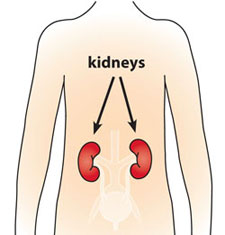
U.S. DEPARTMENT OF HEALTH AND HUMAN SERVICES
Some diseases and conditions put children at risk for kidney disease. Just like for adults, a urine test is used to check for kidney disease before symptoms appear. Learn about the risk factors, urine test, and treatment for kidney disease below.
Your child has two kidneys. Their main job is to filter wastes and extra water from the blood. Wastes and water pass through the kidneys and leave the body as urine. The kidneys also make hormones that help the body make blood and keep the bones strong.

Infections or other health problems can cause kidney disease. When a child has kidney disease, the kidneys may not work normally. This may lead to high blood pressure or a harmful buildup of wastes in the body.
A urine test can be used to check for kidney disease if your child is at risk. Testing is important because early kidney disease often has no symptoms. Your child will urinate in a cup, and the sample will be tested for kidney disease.

The urine test checks for albumin. Albumin is a protein in the blood that is too big to pass through healthy kidneys. If your child's kidneys are damaged, small amounts of albumin can pass into the urine through the kidneys. In general, the more albumin there is in the urine, the more damaged the kidneys are.
A high urine albumin level may mean that your child has kidney disease. Your health care provider may do other tests for kidney disease, including a blood test, which checks how well the kidneys are filtering.
Kidney disease has many possible causes. The first step is to learn the cause of the kidney disease. Medicine and other treatments usually can't undo the damage that has been done, but they may help prevent more harm. Your provider may ask you to take your child to a pediatric nephrologist - a doctor who treats children with kidney disease.
Your child may be at risk for kidney disease if he or she:
Other conditions that may put your child at increased risk for kidney disease include:
For more information about kidney disease in children call the National Kidney and Urologic Diseases Information Clearinghouse toll free at 1-800-891-5390 or visit National Kidney & Urologic Diseases Information Clearinghouse (NKUDIC).
The NIDDK conducts and supports research to help people with kidney disease, including children. Parents interested in enrolling children in clinical trials of new treatments can find a list of centers at www.ClinicalTrials.gov.



Page last updated: March 1, 2012